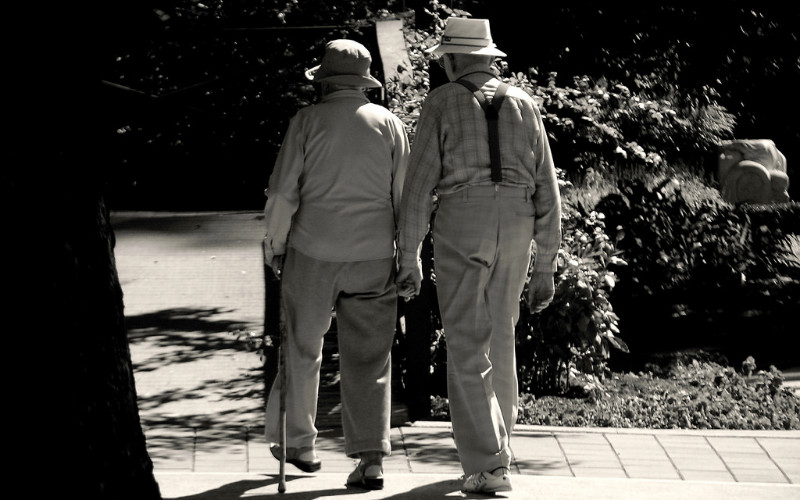The Happy Moment
Arthur Boatin
Yesterday’s had been their final quarrel, that much was sure. During the night Jacek had died—just like that—and what was more final than death? When he didn’t appear in the morning and failed to answer her calls, Elza had struggled to her feet, leaning on the walker, and inched her way down the hall, biting her lip with each step, close to his room tripping on clothes on the floor and inching around stacks of newspapers. She found Jacek in his bed, wearing striped short-sleeved pajamas. Hands spread on his chest, clasping his own breasts, beak thrust at the ceiling, jaws pulled wide as if in one last yell. Dzieki Bogu for one mercy: below his bristling brows, Jacek’s eyes were clamped shut.
Their final fight might have been about any of fifty issues: the best setting for the air conditioner (he liked low, she was never cool enough); whether at night to turn off the A.C. and open a window (what? he didn’t get air enough, thirty years on a bulldozer?); which evening news to watch (he wanted Brokaw, she liked Jennings); which TV drama to tune in Tuesdays at 9 p.m. (her hospital interns or his FBI-undercover-in-the-Mafia); whether or not Vernor’s Ginger Ale, in cans the way they sold it now, tasted anything like the spicy bottled drink that Elza discovered her first week in America (not that here in south Texas you could buy Vernor’s, canned or bottled); whether she ought to cut down on smoking (to what? not stunt her growth?); and if smoke she must, would she for God’s sake do it outdoors, to spare Jacek’s sinuses (the smoking dispute petered out after Elza’s diabetes got worse, and then they diagnosed bladder cancer, and then advancing arthritis and cartilage loss and water on the knees kept her mostly in bed. now she smoked where she lay, and he pretended to choke when he walked into her room).
They might also have disagreed one last time about the garbage pail under the kitchen sink: was it full enough yet to yank the plastic liner and lug it outside to the big can (last week the smell of rotting food had reached under the door of her bedroom, while Mr. Delicate Sinuses, even when laying out their dinner on the Formica table, didn’t catch a whiff); or which of them had caused the vast sticky stain on the kitchen linoleum that would not clean up (as if Elza still handled liquids in the kitchen); or whether she and Jacek had done the right thing twenty-three years earlier in selling their house in Hamtramck, Michigan, relocating, without most of her treasured possessions, to a double-wide trailer in Brownsville (“On the Border…By the Sea”), fifteen hundred miles from family, friends, and shopkeepers who greeted them in their native language.
They might have differed once more over whether Jacek, now that he’d turned eighty-eight, could still function as his wife’s caregiver—her bather, feeder, medicator, keeper—or had the time finally come to spend the money they’d saved during two decades without heating bills and winter clothes, and from eating three times a week what he caught on a line off the ocean pier, and by never, ever taking a trip (unless crossing the border to Matamoros for cheap beer and cigarettes you call a trip). Jacek wanted to hire home nurses for her, never mind the cost. Her welfare was priceless, he said. But Elza was outraged when she heard the hourly rate for licensed practical nurses, women whose Southern or Spanish accents she might not understand. And she couldn’t bear the thought of strangers in their home, even if home was a trailer.
As it turned out, the couple’s final argument had been about food, although not fish or soft drinks or stinky garbage or who would prepare her meals. They’d disagreed whether the Mazowiecki milk sausage, sent by their grandniece Brittany in Dearborn Heights and lost track of by Jacek in the refrigerator for who knew how many months, was now dangerous to eat. In Elza’s opinion it was. Yesterday lunchtime Jacek had insisted on carrying a slice to her bedside for inspection. Of course he used his bare fingers. Since she kept the venetian blind by her bed permanently shut, he snapped on the bedside lamp for the viewing. “Nice,” he purred, of the dangling meat.
She lifted her head stiffly and peered. Without her eyeglasses, his thick fingers might themselves have been sausage links. “Spots,” she pronounced. “Green, soon.”
“Nie badz glupia!” Jacek bellowed. “We ate worse-looking things after war. Lucky to get meat at all.”
Elza let her head fall back on the pillow. She sighed deeply. “I don’t feel today lucky. Have my share!”
Jacek didn’t appreciate the gift—or maybe the spirit in which it was offered—but he ate the whole sausage. Elza had made do with a little cottage cheese.
Now she stood trembling in her nightgown before his deathbed, its sheets just as gray under his lifeless head, its blanket just as torn as the last time she’d entered this narrow room—one year ago? three years? Ugh! the sour smell in here! Sweat rolled down her flushed forehead and full cheeks. She gave her bulk to the walker, chest upon forearms that pressed flat on the front bar, head hanging in front, panting the way Casimir, their beagle back in Michigan, used to do after chasing a rabbit. Look away from the bed she might, yet the obvious question swam in her mind: had Jacek died of food poisoning? And if spoiled milk sausage was the agent, had Elza, by not stopping him from eating it—indeed, by adding to the amount he consumed—had she abetted his dying?
“Idiotyzm!” Jacek would say of this reasoning, if he could speak. “Did you make me eat?”
“I let you eat.” She raised her head and addressed the corpse of her husband. Avoiding the yellow teeth in the yawning maw, she focused on the curly hair at the top of his chest. “I’m what-you-say… accomplice.”
“And how you will stop me eating?” he’d mock. “With fists? Or maybe grab meat from my plate and run, like quarterback? Pass sausage to toilet?”
“I should explain more on risk. Beg. Throw hysteric.”
“Boof!” he’d scoff, drawing on his repertory of made-up words. “Crying to what? Spoil my appetite?”
“To distract, you’ll not eat this bad meat. To not go along. But”—she shook her head mournfully—”I take easy way. When I refuse sausage, I know you will eat—every bite. I am, like Nixon, co-con-spi-ra-tor.”
“So, instead what? It’s bad, and you should eat, too?”
“I can’t persuade you not to, then yes.”
“Kroosh! Ninny! Then we’re both dead.”
Elza drew herself up. Sucking in her lips, she nodded twice. Jacek lay as before, but less rigidly, perhaps. The fact that he didn’t move so much as a hair, never changed expression—gruesome though it was—was coming to seem reliable. Lifting and turning the walker, she needn’t say to him, “Wait here.”
She reached her own room seven minutes later. Heaving and sweating more than ever, she plopped in the wide chair next to her bed and fumbled for the Marlboro Lights on the side table. She sat perfectly still except for her lower right arm, which raised the lit cigarette to her lips and took it down. Soon she put her lighter to a second cigarette: pleasure, now, more than treatment. By the time it had burned down she was breathing almost normally. Using the walker to drag herself to her feet, she edged toward the bathroom. Lifting one swollen leg at a time, she crept over the sill and pushed the door shut behind her. The wall cabinet left of the sink had knobs she could reach with one extended hand. Pulling open first the left door and then the right, she began to search inside for the patch supply.
It was Jacek’s job to change her pain patches. Every three days, off with the old and on with the new. If they both forgot, Elza’s suddenly tender knees—and elbows, and hip joints, and knuckles—soon reminded her. Dr. Peterman’s nurse had taught him how to do it years ago, and he took pride in his handiwork. Describing the procedure to the old couple in the next trailer, he made it sound like brain surgery. In fact, it was all straightforward. A three-by-three-inch square, self-adhering, that felt like so much gauze against her skin. No needles, no tubes. The medicine passed through her skin, the nurse explained. The only reason Elza needed Jacek—or someone—to change her patch was its location. Even when younger and more limber, she could not conveniently reach her upper back, below the neck, to stick on with accuracy a Band-Aid, say.
Elza knew more about the patch than she let on to her husband. When she had first been prescribed it, while he was out fishing one day she used a magnifying glass to read off the paper wrapper the contents of this new “medicine.” A few of the ingredients she had heard of. Every one was a painkiller, ten or fifteen different kinds, and some of them heavy duty. Like codeine. And morphine. Morphine! Jezus, Maryja, Josefie swiety! Years ago she had seen a movie, Monkey on My Back, a true story about a marine who was given morphine to treat malaria that he caught while fighting on Guadalcanal. The poor man ended up addicted, nearly lost his wife, became like a criminal. What did it mean that Dr. Peterman prescribed for his patient such powerful, habit-forming drugs? Why was he willing to make of her—sooner or later—an addict?
Elza understood then she was not going to get better. All they could do for her condition was dull the pain—or try to. She’d started with the twenty-five-percent patch—the weakest, she guessed. After a year or two that wasn’t strong enough, so she’d been moved up to fifty percent. Now fifty wasn’t doing the job, but she had kept that to herself. Because what happened when you got to a hundred percent and you still ached—it hurt you just to breathe—and no higher dosage was left?
There was more that Elza knew. The patch didn’t have to be applied to a person’s back. To be effective, the drugs must reach the bloodstream so they can circulate. Anyplace on the body that’s central and meaty would serve, and meaty places she had plenty. Places she could reach. And she knew how to apply the patch.
Elza placed the box of patches on the sink. She raised the nightgown to her waist and held it there, flipped down the toilet cover, and lowered her bare bottom—bonk!—to the cold wood. Slowly she worked the garment up her trunk, above the obstacle of her bosom, and wedged it, damp and crumpled, under her arms. Eight patches remained in the box. One at a time she tore open the wrappers and administered to herself all of them: two on her soft belly, wide left and right of the sunken navel; two on her abdomen, above the mat of gray crotch hair; one at the top of each flabby thigh, inches below her trunk; and one on each downcast breast, above the brown nipple. She prayed eight was enough. Then she came up, groaning, to her feet, and breathed through her open mouth while studying in the mirror on the door the result of her efforts. Somehow she had spaced the patches evenly, outlining unintentionally the trunk and leafed-out branches of a tree. If you drew a line between the patches, you’d see it. Or maybe it was a football goalpost. Anyway, a harmonious design. For the first time in years she enjoyed the sight of her body. “Jacek,” she whispered, “look at this, Jacek.” Of course she’d have liked to put on a clean nightgown—following a bath, after a hair wash and set—but without help all these were beyond reach. So she prolonged this happy moment, turning left, right, preening a little, before letting the curtain of her wrinkled garment fall, temporarily, about her decorated body. Then Elza turned the walker one last time toward her husband’s bed.
END
Provenance: Submission
Arthur Boatin has published fiction in Worcester Review, The Dissident, Whetstone, Paragraph, Route 9, Puckerbrush Review, and Western Humanities Review. His essays and journalism have appeared in The Boston Phoenix, Technology Illustrated, and The Downeast Coastal Press.
Featured Image: “old couple” by spazbot29 is licensed under CC BY-SA 2.0


No Comments